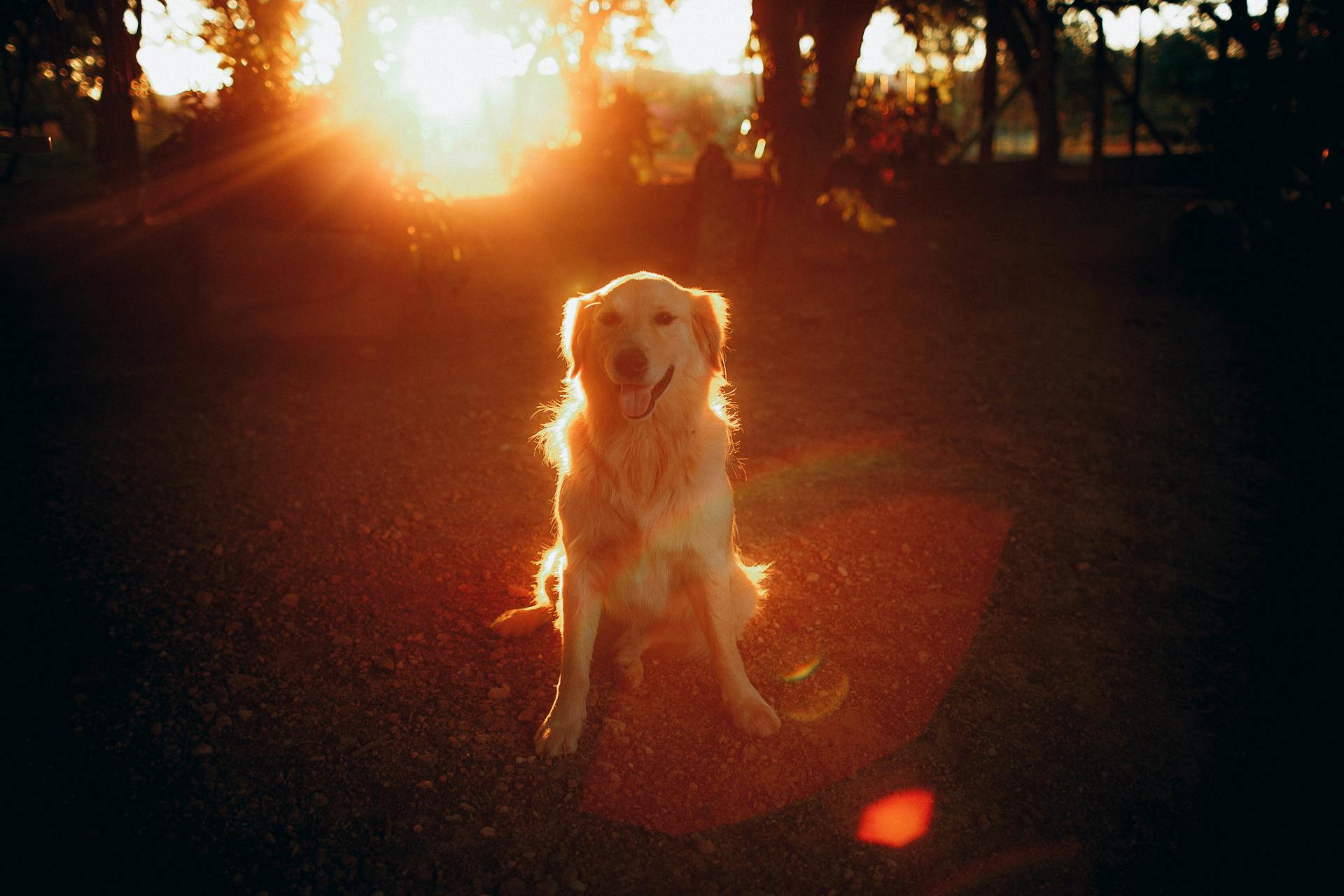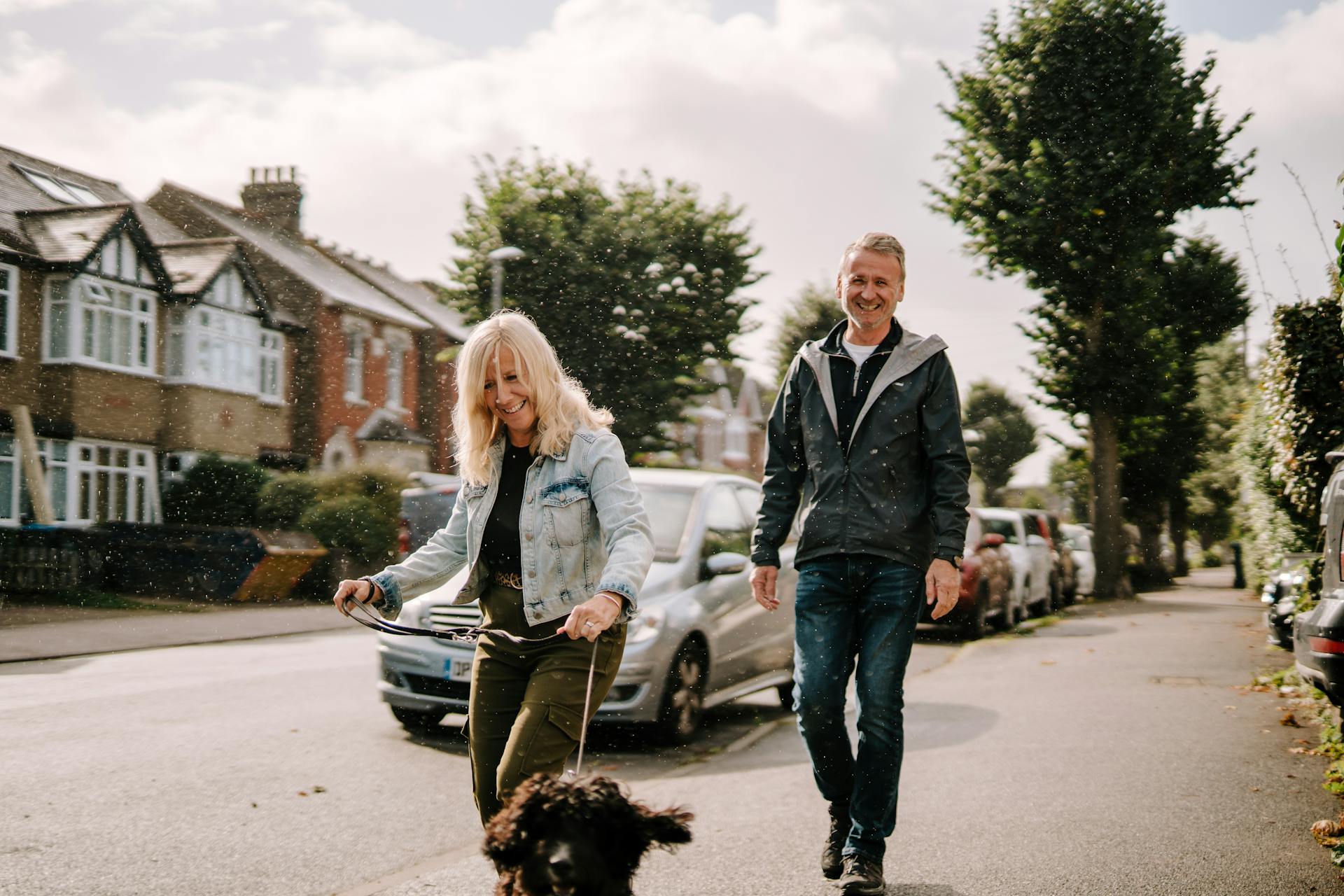
Dog dementia sundowning can be a challenging and confusing time for pet owners. As a condition that affects older dogs, it's essential to understand what's happening to your furry friend.
Dogs with cognitive decline often experience a significant increase in anxiety and agitation in the late afternoon or early evening, which is known as sundowning. This phenomenon is not unique to dogs and is also observed in humans with dementia.
The exact cause of sundowning in dogs is still not fully understood, but it's thought to be related to the natural fluctuations in cortisol levels that occur throughout the day.
As the day wears on, dogs with dementia may become more restless, pace back and forth, or exhibit destructive behavior, making it difficult for owners to provide a comfortable and safe environment.
What is Dog Dementia Sundowning?
Dog dementia sundowning is a common phenomenon that affects many dogs as they age. It's characterized by a significant increase in anxiety, confusion, and restlessness in the late afternoon or early evening.
Dogs with cognitive decline often exhibit this behavior due to the degeneration of brain cells, which disrupts their normal routines and patterns.
As the sun sets, dogs may become more agitated, pacing back and forth, whining, or even trying to escape. This is a result of their brain's inability to distinguish between reality and fantasy.
Some dogs may also exhibit changes in their sleep patterns, becoming more active at night and less active during the day. This can be challenging for owners who are used to a consistent routine.
In severe cases, sundowning can lead to destructive behavior, such as digging or chewing, as dogs try to cope with their confusion and anxiety.
Symptoms and Signs
Dogs with canine cognitive dysfunction may exhibit symptoms associated with senile behavior and dementia, such as getting confused in familiar places and experiencing abnormal sleeping patterns.
Some common symptoms of Sundown Syndrome in dogs include pacing and restlessness, disorientation, anxiety, aggression, irrational barking, and disrupted sleep patterns, which typically occur in the late afternoon to early evening.
Pacing back and forth or in circles, getting lost in familiar places, and staring into space or at walls are all signs of dog dementia.
Here are some specific symptoms of dog dementia to look out for:
- Pacing back and forth or in circles
- Getting lost in familiar places
- Staring into space or at walls
- Walking into corners or other tight spaces and staying there
- Appearing lost or confused
- Waiting at the “hinge” side of the door to go out
- Failing to get out of the way when someone opens a door
- Failing to remember routines, or starting them and getting only part way through
- Sundowning
It's essential to note that any apparent CCD symptom could also point to a serious, and perhaps treatable, medical condition, so it's crucial to consult with a veterinarian first.
Diagnosis and Treatment
Diagnosing dog dementia sundowning requires a thorough evaluation of your dog's symptoms and overall health. Your veterinarian will ask for a detailed history of your dog's health, including the onset and nature of the symptoms and any possible incidents that may have triggered them.
To rule out other medical causes, your veterinarian will perform a complete physical examination, routine blood tests, thyroid testing, ultrasounds, and X-rays. They may also recommend advanced imaging like a CT scan or MRI.
A diagnosis of canine cognitive dysfunction syndrome (CCD) is made when a dog exhibits a combination of symptoms such as disorientation, interaction changes, sleep/wake cycle changes, housebreaking issues, and decreased physical activity level. These symptoms can also be indicative of other conditions, so it's essential to rule out all other potential medical issues before diagnosing CCD.
Treatment for dog dementia sundowning typically involves a combination of environmental changes, dietary modifications, and medication. Your veterinarian may recommend increasing your dog's physical and mental stimulation, providing a predictable environment, and managing their sleep-wake cycle. They may also suggest a prescription diet or supplements to improve your dog's cognitive function.
Here are some common prescription diets for brain health:
- Hills' b/d
- Royal Canin's Mature Consult
- Purina Pro Plan's Neurocare
These diets are typically rich in antioxidants, vitamins, and minerals that support brain health. Your veterinarian may also recommend additional supplements such as omega fatty acids, melatonin, and vitamin B to help manage your dog's symptoms.
What Causes?
What Causes Dog Dementia?
Dog dementia is a complex condition, and its causes are not yet fully understood. As with human dementia, the buildup of sticky proteins called beta-amyloid plaques around neurons is considered a leading culprit.
These plaques can disrupt nerve impulse transmission, causing problems with learning, memory, and coordination. Aging is a major factor, as the brain atrophies and some cells die off as a dog gets older.
As a dog ages, the brain's ability to function properly is impaired, leading to the symptoms of dog dementia. The areas of the brain responsible for learning, memory, and coordination are particularly affected by this process.
Diagnosis

Diagnosis is a crucial step in determining if your dog has Canine Cognitive Dysfunction (CCD). A veterinarian will need to rule out other medical causes for the symptoms, which may include thyroid disorders, Cushing's disease, diabetes, kidney disease, musculoskeletal disease, cancer, liver problems, and sensory loss.
To diagnose CCD, veterinarians will typically perform a complete physical examination, routine blood tests, thyroid testing, ultrasounds, and X-rays to rule out other diseases that may lead to behavioral changes associated with CCD. They may also recommend advanced imaging like an MRI or CT scan.
In order to properly diagnose CCD, there are a set of symptoms that veterinarians look for, including:
- Disorientation – loss of ability to navigate the house or remember where specific places are
- Interaction changes – decreased interest in social interaction
- Sleep/wake cycle Changes – restlessness throughout the night, sleeping during the day
- Housebreaking issues – defecating indoors, not signaling to go outside
- Physical activity level – decreased interest in being outside, decreased responses to stimuli
It's essential to take your dog to the veterinarian as soon as you notice any of these symptoms, as the earlier your dog is diagnosed, the better you can manage their symptoms of canine dementia.
Treating
Treating canine cognitive dysfunction requires a multi-faceted approach. There is no cure, but various medical aids can help mask symptoms as the disease progresses.

Exercise increase, new toys, and learning new commands have shown increases in memory in dogs with CCD. Changing a dog's diet can also improve memory and cell membrane health.
Medication is a highly effective way to mask symptoms of CCD. Anipryl (selegiline) is the only drug approved for use on dogs with canine cognitive dysfunction, and it has shown drastic improvement in quality of life.
In addition to medication, behavioral therapy can be used to help keep dogs comfortable and active. Your veterinarian may suggest employing a special, balanced diet to improve cognitive function.
Prescription diets for brain health, such as Hills’ b/d, Royal Canin’s Mature Consult, and Purina Pro Plan’s Neurocare, are rich in antioxidants and other nutrients that support cognitive function. Additional supplementation of omega fatty acids can also be beneficial.
Here are some common prescription medications for CCD:
- Anipryl (selegiline)
- Propentofylline (to improve blood circulation in the brain)
- Anti-anxiety medications (for dogs with anxiety-related symptoms)
Your veterinarian will evaluate your dog periodically to monitor their response to therapy and the progression of symptoms. It's essential to notify your vet immediately if you notice any behavioral changes in your dog.
Managing Sundowning
Start by blocking off unsafe areas in the house, such as stairways and behind the couch, to prevent accidents.
Respect your dog's desire to either mingle with or avoid people and dogs, and provide a quiet room where they can rest if needed.
Pay attention to hearing loss and speak as you approach your dog, stamping your foot so they can feel the vibration through the floor.
Consider adding nightlights to help your dog see clearly and avoid getting stuck.
Some dogs may benefit from an extra walk right before bedtime to wear them out and lead to longer, deeper sleep.
You can try using "doggy diapers" if your dog is having trouble with house soiling due to dementia, but be prepared to change them frequently and clean your dog as needed.
Here's a list of things to consider when managing sundowning:
- Block off unsafe areas
- Respect your dog's desire for company or alone time
- Pay attention to hearing loss
- Add nightlights
- Consider an extra walk before bedtime
- Use doggy diapers if needed
Managing the Signs
Managing Sundowning requires a thoughtful approach to create a safe and comfortable environment for your dog. Start by blocking off unsafe areas in the house, such as stairways and behind the couch, to prevent accidents.
You should also respect your dog's desire to either mingle with or avoid people and dogs. If they want company, watch for signs of fatigue, and if they prefer to opt out, provide a quiet room for them to rest.
Pay attention to your dog's hearing loss, and if they are asleep, speak as you approach and stamp your foot so that they can feel the vibration through the floor and know you are near.
Nightlights can help your dog see clearly and reduce the likelihood of getting stuck. For some dogs, an extra walk right before bedtime can wear them out, leading to longer, deeper sleep.
Here are some additional tips to help manage sundowning:
- Use doggy diapers to address house soiling due to dementia.
- Consider adding extra walks during the day to give your dog more chances to eliminate.
- Use a canine litter box or other indoor potty device, and place it in a convenient location.
- Try activities like sniff walks and using new food puzzles to enrich your dog's life.
By implementing these strategies, you can help create a more comfortable and safe environment for your dog during sundowning.
Natural Therapies
Natural Therapies can be a valuable addition to your dog's sundowning management plan. CBD oil, for example, has been reported to help balance the nervous system, restoring tranquility and resilience in dogs with sundowner syndrome.
Massage is another natural therapy that can be beneficial. As a canine masseuse can show you techniques to use at home, touch between owner and dog stimulates the production of happy hormones like dopamine, a natural relaxant.
Lavender and geranium essential oils have natural calming properties and can be used in a diffuser to create a relaxing environment for your dog. However, they shouldn't be applied directly to your dog's skin or food.
Acupuncture or acupressure, ancient Chinese remedies, have been transferred to our beloved canines and can be effective in reducing sundowner syndrome symptoms. Many dogs seem to get good results from acupuncture, which increases blood flow and stimulates hormone release.
Here are some natural therapies to consider:
- CBD oil to balance the nervous system
- Massage to stimulate happy hormones
- Lavender and geranium essential oils in a diffuser
- Acupuncture or acupressure to increase blood flow and stimulate hormone release
Frequently Asked Questions
How do you calm a dog with dementia at night?
Establishing a consistent sleep schedule and daily routine can help calm your dog with dementia at night by reducing anxiety and confusion. A predictable routine can provide a sense of security and stability for your dog
How do I know if my dog with dementia is suffering?
Look for changes in your dog's behavior, such as increased clinginess, withdrawal, or fearfulness, which can indicate they're struggling with dog dementia. If you notice these signs, it's essential to consult with a veterinarian to determine the best course of action
Sources
- https://en.wikipedia.org/wiki/Canine_cognitive_dysfunction
- https://fotp.com/learn/dog-health/sundown-syndrome-in-dogs
- https://www.petmd.com/dog/conditions/neurological/dog-dementia
- https://www.thewildest.com/dog-health/canine-dementia-signs-symptoms-treatments
- https://www.vet.cornell.edu/departments-centers-and-institutes/riney-canine-health-center/canine-health-information/senior-dog-dementia
Featured Images: pexels.com


